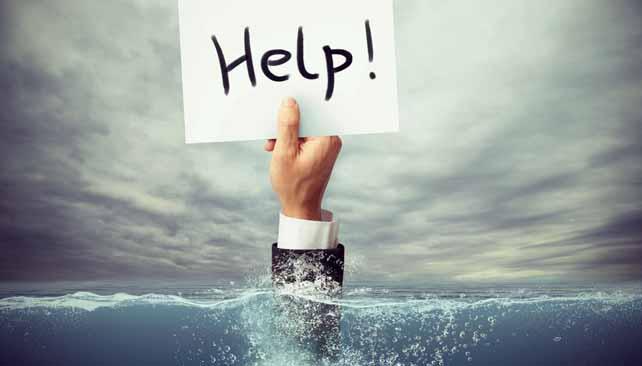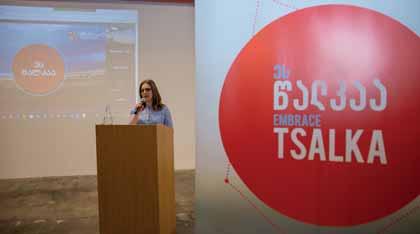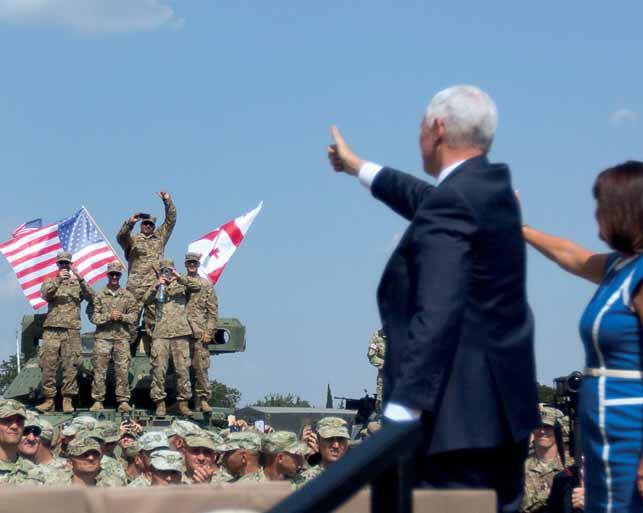
7 minute read
POLITICS PAGE
from Issue #1290
Seven Georgian Schools Join Council of Europe International Network of Democratic Schools
Source of photo: csee-etuce.org
Advertisement
BY KETEVAN SKHIRTLADZE
Seven Georgian public schools have joined the Council of Europe International Network of Democratic Schools, the Ministry of Education, Science, Culture, and Sports announced.
After Tbilisi and Sachkhere schools, schools in Khabume, Khoni, Akhaldaba, Sairkhi, Khashuri, and two schools of Poti were included in the list of democratic schools of the Council of Europe. The Democratic Schools Network is an open platform that aims to establish a democratic culture in schools and share successful school projects across Europe. Work on disputed issues, prevention of bullying, fi ghting against propaganda, disinformation and fake news and discrimination, and improving school wellbeing, are the topics that will be addressed and discussed.
“By joining the Democratic Schools Network, schools will be able to benefi t from: Creating a school website on the Council of Europe Network of Democratic Schools (DSN) website/platform, Financing small projects, Participation/ support in international conferences and competitions, Piloting of Council of Europe materials, and Educational-professional connections with other schools,” the Ministry stated.
The Political Debacle Continues as Parties Once Again Fail to Agree
Continued from page 1
“Compromise is diffi cult for everyone and requires political readiness to take the right steps. However, it has no alternative. The priority is the national interest of Georgia. It is the only way out of the political crisis,” the diplomat said.
He also emphasized the importance of ending the current crisis in order to diversify attention and focus on important issues such as the pandemic, economy and national security.
He told the parties he’d be putting a document on the table the next day, and that it was the responsibility of the leaders of the political parties to sign it. He further explained that the goal is to have a sustainable framework in place for the future.
“This is a way to restore trust,” he said. “This proposal will address the need for systemic reform to increase public confi dence in the electoral process and the judiciary. This is an opportunity for leaders to demonstrate their democratic maturity.”
Ahead of Tuesday’s showdown, leaders of the opposition parties talked with press about the issues covered in the second-to-last meeting with Danielsson.
Salome Samadashvili, member of the National Movement, stated that the issue of political prisoners, particularly the cases of Nika Melia and Giorgi Rurua, were thoroughly discussed with the EU diplomat.
“Everyone, including the mediators, is well aware that without resolving this issue, there will be no room for agreement, and today we had a detailed conversation on the issue of political prisoners, the challenges in the judiciary system in the country, and the problems of justice in terms of politics,” she added.
Leader of the Republican Party, Khatuna Samnidze, said, “This agreement cannot be reached without compromise, and both sides must be ready for that. There will be talk about it and there will be room for compromise when the issue of the prisoners is resolved,” Samnidze said.
The meeting between the opposition and the Georgian Dream, mediated by Christian Danielsson, lasted seven hours and ended without results on March 30.
The Georgian Dream blamed the opposition for the failure to complete the talks, and the opposition, in turn, blamed the government.
Former Prime Minister Giorgi Gakharia responded to the news on Wednesday.
“Yesterday showed us once again that radicalism and radical positions are still the damaging factors that hindered and hinder the construction of the modern Georgian state.
“We must end the political polarization and build a successful state,” Gakharia said in a statement issued on the occasion of the referendum on Georgia’s independence and the birthday of the country’s fi rst president, Zviad Gamsakhurdia.
“The referendum held on March 31, 1991, was the date of Georgia’s declaration of independence, and the beginning of the construction of a modern Georgian state.
“It is noteworthy that the population of Georgia, including the regions of Abkhazia and Tskhinvali, participated in this referendum,” Gakharia said. “Statebuilding is a long and challenging process, and each of us is obliged to contribute to it. We must end the political polarization and focus on building a successful state.”
Also in response to the failed talks, Lithuanian Foreign Minister Gabrielius Landsbergis posted on Twitter, saying he was disappointed with the failure of the agreement between the government and the opposition.
“Grateful for Christian Danielsson and the EU for mediation mission in Georgia. Upset and disappointed that the Georgian Dream and opposition failed to reach an agreement. That sends a bad signal to friends and partners. A period of refl ection is needed,” he tweeted.
The British Embassy also put voice to the overall feeling of disappointment.
“The British Embassy deeply regrets that the Government of Georgia and the Opposition failed to come to a negotiated agreement during the talks mediated by the EU. This is a missed opportunity that will delay Georgia’s continued advancement as well as Euro-Atlantic integration,” they posted on social media.
“The dialogue must continue,” the Embassy emphasized.
“We urge continued progress on judicial and electoral reforms, and all parties to continue negotiations until all issues are resolved.”
How Can You Help People Who Refuse to Be Helped?

OP-ED BY NUGZAR B. RUHADZE
If I shuffl e back to our recent history, I can very well fi gure out the political panic and bewilderment of the early 1990s. I would not fail to evaluate the sociopolitical muddle and stupefaction of those bizarre times in Georgia; I would even be able to go into a pertinent analysis of the dreadful wrongdoings and transgressions of our erstwhile communist leaders. But I will never comprehend the reasons for the current political debacle within Georgia’s now-functioning political spectrum.
In the 1990s, in the wake of the socialist economic breakdown and the ensuing social catastrophe, anything could have taken place: a misunderstanding of freedom, misapprehension of democracy, misinterpretation of capitalism or misconception of private ownership. The soviet Georgians had zero experience in handling the new way of life, drastically different from what they had experienced before, hence the confusion and disorientation. Now that our society has under its belt over thirty years’ experience of national independence and democracy; now that that we have already joined the receptive western realm; now that we defi nitely know the taste of free elections; now that we have fi nally acquired the image of a democratically developing nation and have an ambition to be part of a better cultivated world, why are we failing to inculcate all those cherished western values and ideals? Why can’t we talk to each other like civilized people, without desperately cries of ‘help, help’ every step of the way as if we are still wrapped in our ever-wet political swaddles?
Thank God the helpers of Euro-Atlantic origin have not yet desisted from believing in our civility and intelligence, readily and patiently rushing to our assistance as soon as they hear our desperate shouts. They sincerely want to help, but, again, how can you help people who utterly refuse to be helped?
On a less offi cial level, we, the eternal watchers of this never-ending political clutter and mishmash, are getting seriously sick and tired of hearing the thousand-times reiterated words and phrases, emanating from the same unabashed faces of Georgia’s ever-present political gamblers, who have nothing new to say and are forever stuck in their obsessive desire to grab the wheel and steer the nation without even knowing the exact destination they want to reach. So, why are we in this odd political crisis, if it could be called a crisis at all?
Comprehension of the situation by regular folks like me has become practically impossible, because the two sides of the puzzle are talking about the same subject using totally different vocabulary, attitudes and interpretations. It is absolutely impossible to tell right from wrong. People hear two drastically varying judgments after every joint session of the ruling power and its opposition, in pursuit of truth and concord, sweated over by our European facilitators, with a negligible result so far.
The keystone of the entire hullabaloo is the issue of fairness of the outcome of the latest parliamentary elections in Georgia, which the West has unanimously qualifi ed as competitive and effi ciently administered. The resulting perplexity materialized after the conspiratorial decision of oppositional forces to reject the mandates granted them by vox populi. We, the outsiders, have little idea about the current goings-on within the walls where the negotiations are taking place. We only hear the absolutely contradictory evaluations of the process. There is a feeling that something is warped, distorted, misrepresented. How long will the squabble last, and how far into the debris will this interminable bicker take the country? There is no answer looming on the horizon, and there might be no answer for quite a while to come. The scrum made of those who have a fi nger in the pie is massive and multihued, the jostle is intensive and the shoves are sturdy. It is no longer a minor skirmish as it was a couple of months ago. Meanwhile, our people need to be fed, clad, sheltered and protected, and our young need to be attended to. I just wonder now who will do the job.
Image source: smallbusiness.co.uk




